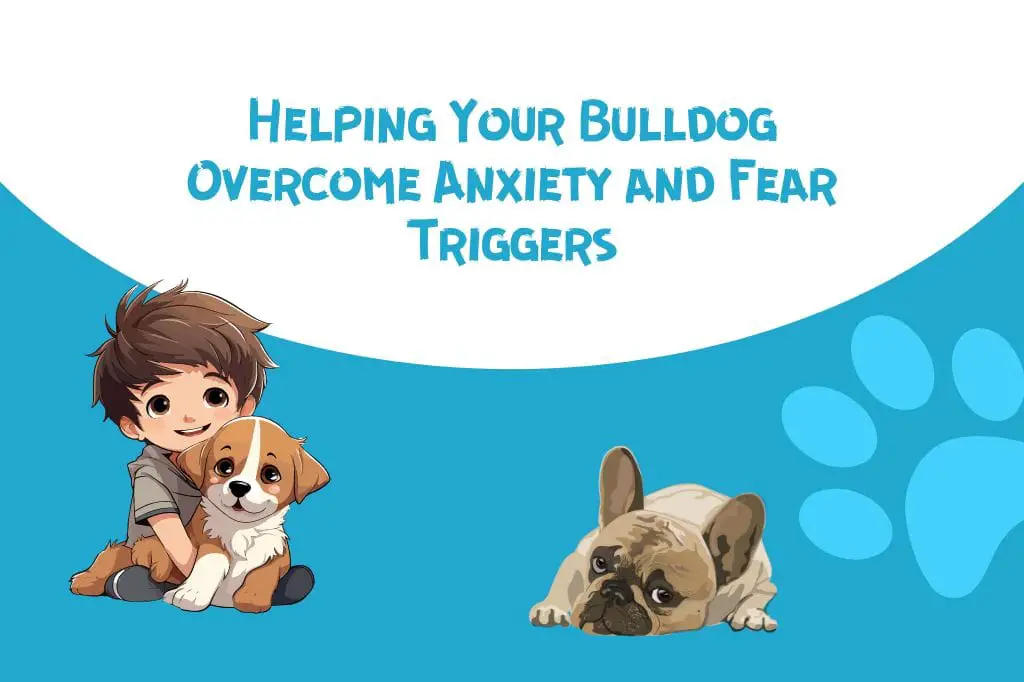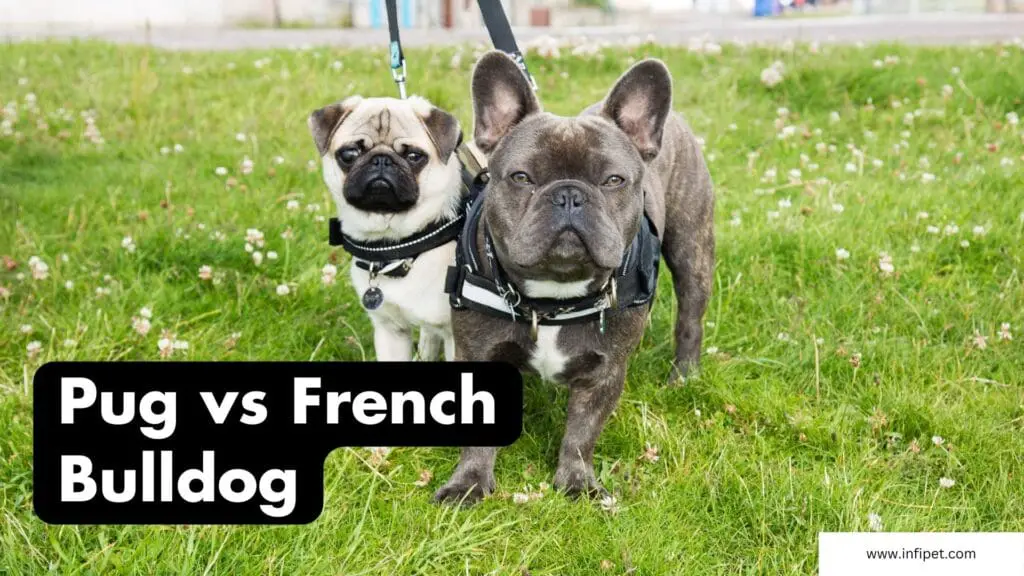Is your Bulldog struggling with anxiety and fear triggers? As a loving pet owner, it can be distressing to see your four-legged friend experiencing fear and anxiety. Fortunately, there are steps you can take to help your Bulldog conquer these fears and live a happier, more confident life.
In this article, we will explore some practical strategies and techniques to assist your Bulldog in overcoming anxiety and fear triggers. We’ll delve into understanding the root causes of their fears, whether it be separation anxiety, loud noises, or unfamiliar environments. With this knowledge, you can tailor your approach to address your Bulldog’s specific triggers effectively.
We’ll also cover the importance of patience and consistency when working with fearful dogs. Helping your Bulldog build positive associations, gradually desensitizing them to their fears, and providing a safe and comforting environment are key steps in their journey toward overcoming anxiety.
By implementing the advice and techniques shared in this article, you’ll be equipped with the tools to help your Bulldog face their fears head-on and lead a happier, more comfortable life. Let’s embark on this journey together.
Understanding anxiety and fear in Bulldogs
Bulldogs, like any other breed, can experience anxiety and fear due to various reasons. Understanding the underlying causes is crucial in helping your Bulldog overcome these challenges. Separation anxiety, loud noises, unfamiliar environments, past traumatic experiences, and lack of socialization are some common triggers of anxiety and fear in Bulldogs.
Separation anxiety is a common issue among dogs, and Bulldogs are no exception. They form strong bonds with their owners and can become extremely anxious when left alone. This can lead to destructive behaviors, excessive barking, and even self-harm. Identifying signs of separation anxiety, such as excessive drooling, pacing, and destructive behavior, is essential in addressing this issue.
Loud noises, such as thunderstorms or fireworks, can be terrifying for Bulldogs. Their sensitive hearing makes them more susceptible to fear triggers associated with loud sounds. Understanding how your Bulldog reacts to these noises and providing them with a safe space or using noise-cancelling techniques can help alleviate their anxiety.
The impact of anxiety and fear on Bulldogs’ behavior and well-being
Anxiety and fear can have a significant impact on Bulldogs’ behavior and overall well-being. It can manifest in various ways, including aggression, excessive barking, hiding, or even withdrawal from social interactions. These behaviors are often their coping mechanisms to deal with their fears and can lead to a decreased quality of life.
Aggression is a common behavioral issue in Bulldogs with anxiety and fear. When they feel threatened or overwhelmed, they may display aggressive behaviors as a defense mechanism. It’s crucial to address the root cause of their anxiety to mitigate aggressive tendencies and create a more harmonious environment for both your Bulldog and your family.
Fearful Bulldogs may also exhibit excessive barking, which can be disruptive and stressful for both the dog and their owners. Understanding the triggers for their barking and implementing techniques to redirect their attention or provide positive reinforcement can help manage this behavior effectively.
Recognizing signs of anxiety and fear in Bulldogs
Recognizing signs of anxiety and fear in Bulldogs is essential for early intervention and effective treatment. Each dog may display different symptoms, but some common signs include excessive panting, trembling, pacing, dilated pupils, and restlessness. Identifying these signs and understanding their body language can help you gauge the severity of their anxiety and tailor your approach accordingly.
Bulldogs with anxiety may also engage in destructive behaviors, such as chewing furniture or excessive scratching. These behaviors are often a result of stress and anxiety and can indicate that your Bulldog is struggling emotionally. Being observant and proactive in addressing these signs can prevent further escalation of their anxiety.
Additionally, changes in appetite, sleep patterns, and overall energy levels can also be indicative of anxiety and fear in Bulldogs. Paying attention to these subtle changes and consulting with a veterinarian can provide valuable insights into your Bulldog’s emotional well-being.
Techniques for helping Bulldogs overcome anxiety and fear
Helping your Bulldog overcome anxiety and fear requires patience, consistency, and a well-thought-out plan. Here are some techniques you can implement to assist your furry friend in their journey toward conquering their fears:
Building positive associations:
Introduce your Bulldog to their fear triggers in a controlled and positive manner. For example, if your Bulldog is scared of car rides, start by placing them in the car without starting the engine and gradually work up to short drives with positive reinforcement and rewards.
Gradual desensitization
Expose your Bulldog to their fear triggers gradually, starting with low-intensity stimuli and gradually increasing the exposure over time. This gradual approach helps your Bulldog build confidence and overcome their fears in a safe and controlled environment.
Counter-conditioning
Pairing the presence of fear triggers with positive experiences can help change your Bulldog’s emotional response. For example, if your Bulldog is scared of strangers, introduce them to new people gradually while offering treats or praise to create positive associations.
Creating a safe and secure environment for your Bulldog
Creating a safe and secure environment is crucial in helping your Bulldog overcome anxiety and fear triggers. Here are some tips to ensure your Bulldog feels comfortable and supported:
Designate a safe space
Provide your Bulldog with a designated area where they can retreat to when they feel anxious or overwhelmed. This space should be quiet, cozy, and filled with familiar items that provide comfort.
Establish a routine
Bulldogs thrive on routine, so creating a consistent daily schedule can help alleviate anxiety. Regular feeding times, exercise routines, and designated play times provide a sense of security and predictability for your Bulldog.
Use calming aids
Consider using calming aids such as pheromone diffusers, calming music, or anxiety wraps to help create a soothing environment for your Bulldog. These aids can help reduce anxiety and promote relaxation.
Common Fear Triggers for Bulldogs
Bulldogs, like any other breed, can develop fears and anxieties due to various triggers. It’s essential to identify these triggers to address them effectively. Here are some common fear triggers for Bulldogs:
1. Separation Anxiety
Separation anxiety is a prevalent fear trigger in Bulldogs. These dogs are known for their attachment to their owners, and being left alone can cause them distress. Signs of separation anxiety may include excessive barking, destructive behavior, and even self-harm.
To help your Bulldog overcome separation anxiety, it’s crucial to gradually desensitize them to your departures. Start with short periods of separation and gradually increase the time. Provide interactive toys or puzzles to keep them occupied and create a calm, safe space for them. Avoid making a big fuss when leaving or returning home, as this can exacerbate their anxiety.
2. Loud Noises
Bulldogs can be sensitive to loud noises such as thunderstorms, fireworks, or even household appliances. These sudden and loud sounds can trigger fear and anxiety in your furry friend. It’s important to provide a safe and secure environment during such situations.
Create a designated “safe space” for your Bulldog where they can retreat when they feel scared. This can be a quiet room with their bed, toys, and familiar scents. Additionally, you can introduce them to gentle sounds gradually, using audio recordings or specialized sound desensitization programs designed for dogs.
3. Unfamiliar Environments
Bulldogs can feel uneasy in new or unfamiliar environments. Changes in routine, visiting new places, or encountering unfamiliar people or animals can trigger fear and anxiety. It’s important to introduce your Bulldog to new experiences gradually, ensuring they feel safe and supported.
Start by exposing them to low-stress environments, such as quiet parks or calm streets, gradually increasing the level of stimulation. Use positive reinforcement and reward-based training to help your Bulldog associate new environments with positive experiences. Patience and consistency are key in building their confidence and reducing anxiety in unfamiliar situations.
Socialization and Desensitization Exercises for Bulldogs
Socialization and desensitization exercises can play a crucial role in helping Bulldogs overcome their fears. These exercises involve gradually exposing them to fear triggers in a controlled and positive manner. Here are some effective techniques to consider:
1. Controlled Exposure
When working with fear triggers, it’s important to introduce them in a controlled manner. For example, if your Bulldog is afraid of strangers, start by introducing them to one calm and friendly person at a time. Allow your Bulldog to approach at their own pace and reward them for calm behavior. Gradually increase the number of people and the level of interaction as your Bulldog becomes more comfortable.
2. Positive Reinforcement
Positive reinforcement is a powerful tool in overcoming fears and anxieties. Whenever your Bulldog exhibits calm behavior or shows signs of progress, reward them with praise, treats, or their favorite toy. This positive association helps them build confidence and reduces their fear response. Consistency is key, so be sure to reward desired behavior consistently.
3. Gradual Desensitization
Gradual desensitization involves exposing your Bulldog to fear triggers in a controlled and gradual manner. For example, if your Bulldog is afraid of loud noises, start by playing recordings of low-volume sounds and gradually increase the volume over time. Pair these sounds with positive experiences, such as treats or playtime, to create positive associations. With repeated exposure, your Bulldog will become less reactive to these triggers.
Remember, desensitization exercises should be done at your Bulldog’s pace. Pushing them too quickly can exacerbate their fear and anxiety. Monitor their body language and behavior, and adjust the intensity of exposure accordingly.
Seeking Professional Help for Bulldog Anxiety and Fear
If your Bulldog’s anxiety and fear persist despite your efforts, it may be beneficial to seek professional help. A veterinarian or a professional dog trainer experienced in working with anxious dogs can provide valuable guidance and support.
A veterinarian can assess your Bulldog’s overall health and determine if any underlying medical conditions are contributing to their anxiety. They can also prescribe medications or recommend natural remedies to help manage your Bulldog’s anxiety.
A professional dog trainer can develop a customized training plan tailored to your Bulldog’s specific needs. They have the expertise to address your Bulldog’s fears and anxieties effectively, using positive reinforcement techniques and behavior modification strategies.
Remember, seeking professional help is not a sign of failure but rather a proactive step in providing the best care for your Bulldog. Professional guidance can make a significant difference in helping your Bulldog overcome their anxiety and fear.
Natural Remedies and Supplements for Calming Bulldogs
In addition to behavioral techniques and professional guidance, natural remedies and supplements can also help calm Bulldogs with anxiety and fear. Here are some commonly used remedies:
- CBD oil: Cannabidiol (CBD) oil is derived from hemp plants and has been found to have calming effects on dogs. It can help reduce anxiety and promote relaxation. Consult with your veterinarian to determine the appropriate dosage for your Bulldog.
- Lavender: Lavender has soothing properties and can help calm Bulldogs. You can use lavender essential oil in a diffuser or diluted in water as a spray. However, be cautious and ensure that your Bulldog does not ingest or come into direct contact with undiluted essential oils.
- Calming supplements: There are various calming supplements available specifically formulated for dogs. These supplements often contain ingredients such as chamomile, valerian root, or L-tryptophan, which can help reduce anxiety and promote relaxation. Consult with your veterinarian to determine the best supplement for your Bulldog.
It’s important to note that natural remedies and supplements should be used under the guidance of a veterinarian. They can provide recommendations based on your Bulldog’s specific needs and ensure the safety and effectiveness of these remedies.
Conclusion: Empowering Your Bulldog to Overcome Anxiety and Fear
Helping your Bulldog conquer anxiety and fear is a journey that requires patience, understanding, and consistency. By understanding the root causes of their fears, recognizing the signs of anxiety, and implementing appropriate techniques, you can make a significant difference in their well-being.
Creating a safe and secure environment, incorporating socialization and desensitization exercises, and seeking professional help when needed are all crucial steps in helping your Bulldog overcome anxiety and fear.
Remember, every Bulldog is unique, and progress may take time. Celebrate small victories along the way and continue to provide a loving and supportive environment for your Bulldog. With your dedication and the right approach, you can empower your Bulldog to face their fears head-on and live a happier, more



